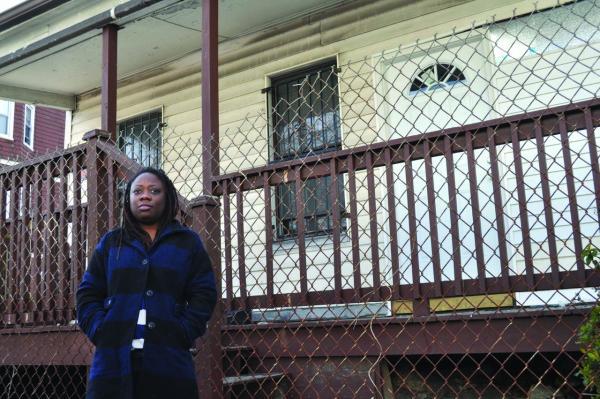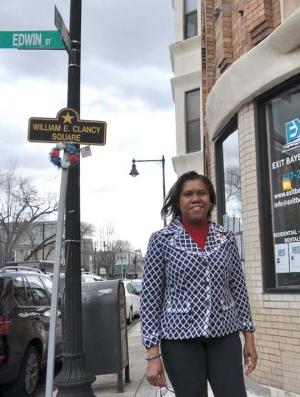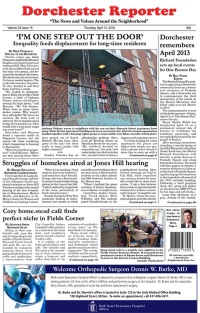April 20, 2016

Dorchester native Vantrice Taylor in front of her former home on Ceylon Street. She's moving to Troy, NY to find an affordable home. “It’s crazy because I really haven’t lived anywhere else." Jennifer Smith photo
Second of two parts. Read the first part here.
Vantrice Taylor was born and raised in Dorchester and she would like to stay. But this summer, she will be moving with her family to upstate New York. A former “Youth of the Year” at the Boys and Girls Clubs of Dorchester, Taylor has deep roots here: She and her family have shared their Ceylon Street three-decker for more than four decades.
“Except for college, I’ve lived in the same house all my life,” she said. “It’s been home for 41 years to relatives, friends, and people who needed a place to stay. We called it “The Honeycomb” because people were always buzzing in and out of it."
Part One: "I'm one step out the door" —As Boston booms, longtime residents feel the housing squeeze
“I started at the Dorchester Boys and Girls Club when I was six years old and I stayed there till I was 18. I was youth of the year through them. They helped me get into college. I worked there after college. My daughter is swimming there now. It’s my second family,” said Taylor.
Last winter, with the family’s property taxes on the rise and the cost of heating jumping to nearly $1,000, they decided to sell. “We didn’t have much income,” said Taylor. “My mother, on the first floor, was the only one with a job and she paid most of the bills. I was on disability, so was my uncle on the second floor, and my grandfather on the third floor was on a pension. It became too much.”
The house sold after just eight days on the market and suddenly the family had just 40 days to find a new place, which proved to be no easy task.
“Half of the problem is the price of a house is too high,” she explains. “The other half is, you can’t afford the price of an apartment. People aren’t showing up for the home-buying class at the Boys and Girls Club because they don’t have the money to buy homes.”
Taylor was stunned to find how costly the rents have become in the neighborhood. “We used to know everyone on our street. Now we knew only one family. The people next door, who had been there a long time, moved to Mississippi because they couldn’t afford it here.
“I discovered that the rent is $1,400, sometimes $1,700,” she said. “With disability I don’t even clear $1,000 a month. Now I understand why there are three or sometimes four people living in one apartment. On top of the rent there’s heat, lights, food. What about your kids and their needs?
“So I’m starting over. All of us are starting over. We had the same phone number for 40 years. We had the same address. Now that part of our legacy is gone and it feels like when something historical goes away – ‘Oh, that used to be here.’ It’s that kind of nostalgia.”
Taylor and her family are moving to Troy, New York in August. It’s far more affordable, but she feels like she’s being “forced” into a relocation she doesn’t want to make. Her old house is under construction and all around it new houses are going up. She hears that someone wants to build a farm on one of the vacant lots.
“Who are these improvements for?” Taylor wonders. “The people who lived here, the ordinary people of the city, can’t afford to live anywhere. People used to want to live in the suburbs. Now people in the suburbs want to live in Boston, and people are being pushed out. Who are these people?”
Some change is good, she acknowledges, but at what price?
“People are being evicted from the apartments they lived in and they have 30 days to get out. It’s rough and it’s only getting rougher. They talk about building the middle class but what about people who are already below middle class?”
“It’s crazy because I really haven’t lived anywhere else. When I see that Citgo sign lit up, I’m home. I’m going to miss the local bookshop. Even things like Mike’s Pastries – oh, where am I going to get my cannolis? The corner store – my father carried me there on his shoulders. I’m never going to walk around the corner to that store again.”
•••
Vallery grew up in Roxbury. Keegan moved to Dorchester from Trinidad and Tobago when he was 19. “We met at the hospital where we both worked,” said Vallery. “We saved up to buy a house and start a family.”
The couple stayed with family to save up to buy and in 2015 they got serious: They enrolled in Mass Affordable Housing Alliance’s first-time homebuyer class, secured a realtor, got pre-approved for a mortgage, and began hunting for houses. They hoped to find a two-family house that could help bring in some extra income.
“A three-family would have been completely out of reach,” said Keegan. “And renting was out of the question. The rents now are more than our mortgage payments would be.”
Most of the Boston properties they looked at were at the maximum end of their price range: Between $400,000- $450,000 and all of those were fixer-uppers that needed substantial work. They moved on and recently closed on a house on the west side of Brockton.
It was a great deal, they say. It came with a tenant and fit their budget. But the commute to Boston is anywhere from 45 to 90 minutes each way. “Brockton wasn’t the best option but it fitted us financially,” said Keegan. “I don’t know anyone who’s able to buy in Boston,” said Vallery.
Barbara Rice, an organizer with MAHA, told the Reporter that half of those who attend homebuyer classes would like to buy and stay in Boston, but they can’t.
It’s a familiar story for Carla Stovell, a realtor who owns Exit Realty near Ashmont Station. Dorchester has been her home since she moved here in 1981. She has lived on Blue Hill Ave, Norfolk Street, Glenway, and Talbot Ave. before buying a home off Washington Street. Her oldest daughter is graduating from nursing school, her oldest son is majoring in computer science and social work, and her two younger children are in grade school.
“I would advise my children when they have families, to stay because there is so much more for them here,” she said.
But she doesn’t know if they will be able to. “Dorchester, even Mattapan, is becoming a place where families can’t afford to live,” she told the Reporter. “We have agents with clients who can get a three-family mortgage for $450,000, $475,000, $500,000. But three-families in Dorchester aren’t selling for that price. The prices are $525 and above, $600, $700, and that’s everywhere in Dorchester.”
Her rental clients are also being “totally priced out,” she said.
“They are also priced out of Mattapan. Forget South Boston, it’s not even in the equation. One-bedrooms are going for a minimum of $1,300 and $1,400. We have a lot of clients that have vouchers – veterans. We can’t find housing for them, they’re being pushed out of Boston. They have to go to Quincy, past Quincy, they can go to Brockton, or out to Fall River. They have to leave the city to use the vouchers. It’s very sad, and it’s disturbing. These men and women have served their country and served it well and they’re not being taken care of.
“If I look at it as a realtor, it’s a great thing for us as realtors. But I’m looking at this as a parent with young children.  Carla Stovell: Ashmont-area realtor says her clients can't afford the rents. Families with children will not be able to stay in Dorchester, period.” Jennifer Smith photo
Carla Stovell: Ashmont-area realtor says her clients can't afford the rents. Families with children will not be able to stay in Dorchester, period.” Jennifer Smith photo
“Some sellers bought their houses, raised their families, sent their kids to college. I’m not saying they shouldn’t be cashing in now, and I don’t know if this should be taken into account, but they might want to sell their house to a family that has children and wants to do the same thing.
“Our job as realtors is to get the highest and best price for the sellers. They are our clients, that’s who we’re working for. But I would like for families with children to afford to buy a house in Boston, anywhere in Boston. It doesn’t look as if that’s going to happen.”
Vallery agrees. “I understand when you’re tight for money and someone offers you $500,000 for your house,” said Vallery. “But where are your kids going to live?”
“It goes up the ladder from individual tenants to their communities,” added Sandra Teixeira, a longtime tenant on Hamilton Street who is facing eviction. “You change residents and you change communities.
Me and my daughter are in our third year doing an annual block party so if something happens you know your neighbors. There’s too much transient activity going on. Our communities are breaking down and that leads to violence, homelessness, it’s like a virus that keeps creeping.”
Unfortunately, affordable housing is just as expensive to build as market-rate housing, and there’s not much federal, state, or city money to subsidize it. When affordable apartments become available, a hundred people may apply for each new unit.
Specific trends are also pushing housing out of reach for many. Many would-be homebuyers who could pay monthly mortgages can’t afford the huge down payments banks are demanding. “The banks are afraid to lose the money,” said Stovell. “And they’re not losing money because they’re borrowing money for next to nothing from the feds. On a 30-year mortgage at 3.75 percent, a stellar buyer, good credit, good income, not squandering their money, the banks are making a minimum of 300 percent.”
Dorchester’s familiar three-deckers are also being turned into condos. “Those units aren’t available for the rental market now,” added Stovell. “At the same time it’s not making purchases more affordable. The few condos in Dorchester are all being priced at $300+ for a two-bedroom. You have to add $100,000 if you add another bedroom.”
What solutions are in the air?
Build more housing. Mayor Martin Walsh’s housing plan calls for 53,000 new units by 2030. Walsh’s new Office of Housing Stability will also help keep our existing housing affordable.
More affordable units. The City’s Inclusionary Development Policy (IDP) requires new housing developers to either build affordable housing or pay into the city’s affordable housing fund. The City could require more affordable units, a bigger payment to the city’s fund, and a new definition of “affordability” that makes apartments affordable to families earning under $52,000.
Taxes for affordable housing. The state Community Preservation Act lets cities put a small bite of their property taxes into affordable housing, open spaces, historic sites, and parks. Boston is lagging behind 160 other cities that have adopted the CPA.
Just Cause Eviction. The City Council is considering a new ordinance that would end Boston’s current eviction policy, which allows landlords to evict tenants for no reason. The new Just Cause Eviction policy would list valid reasons for eviction, and when landlords send tenants a notice to quit, they’d also have to notify the city. This way the city or tenant groups could advise tenants of their rights. The proposal exempts landlords who live in their own two- to four-unit homes.
100 percent affordability. When the Boston Redevelopment Authority unveiled plans for mostly market-rate housing in Egleston Square, the Affordable Egleston coalition called for all the units to be affordable – with “affordable” defined by income levels in the neighborhood, not the greater Boston average.
Raise wages. It’s not just the high rents. Today’s low wages make housing unaffordable. Hourly wages have barely risen for most workers over the past 40 years. A labor-backed campaign is calling for a minimum wage of $15 an hour – not enough to afford many apartments, but a start.
Special protections in transit corridors. Prices may rise fastest near transit stops, like the new Fairmount Line stations that put Talbot Ave 12 minutes from South Station. Greater Four Corners Action Council is proposing standards for housing, employment, transit, health, and maybe business development that would mean those living in those transit corridors can stay.
Community-controlled housing. The Dudley Street Neighborhood Initiative pioneered community land trusts in Boston. You buy and own your house, but a community trust owns the land it sits on. This lets you use your house and pass it on to your children, but limits the profit you can make if you sell it, and it keeps that housing affordable to future residents. Community Development Corporations in several neighborhoods are also building housing that will stay affordable over the long term.
Then there’s this approach:
What problem? “In a free-market system, you pay what the market will bear,” Greater Boston Real Estate Board chief Greg Vasil told the Boston Globe in January. “Are we in a free-market system, or not?”
Commentary: A look at possible solutions.
 REP 15-16: 'I'm one step out the door'Read Part One of this series by Mike Prokosch here.
REP 15-16: 'I'm one step out the door'Read Part One of this series by Mike Prokosch here.
For previous Reporter coverage on related topics:
One-third of Dorchester households now use food stamps
Fears of ‘displacement’ in Codman Square as housing costs, demand rise
Shame on you, Bank of America
Housing plan must work for city’s most vulnerable
Tenants at 200 Hancock St. hold rally for safety, decent housing, fair rents
Seller’s market: Boom creates new pressures in Dot market
Development costs cripple both builders and buyers
City needs to clarify its goals on housing
Advocates: Housing plan could hurt Section 8 holders
Mattapan forums asking: How to help residents stay here?
In Mattapan, youth engaged in anti-displacement cause
Walsh adds $1.3m to budget to bolster homeless initiative



